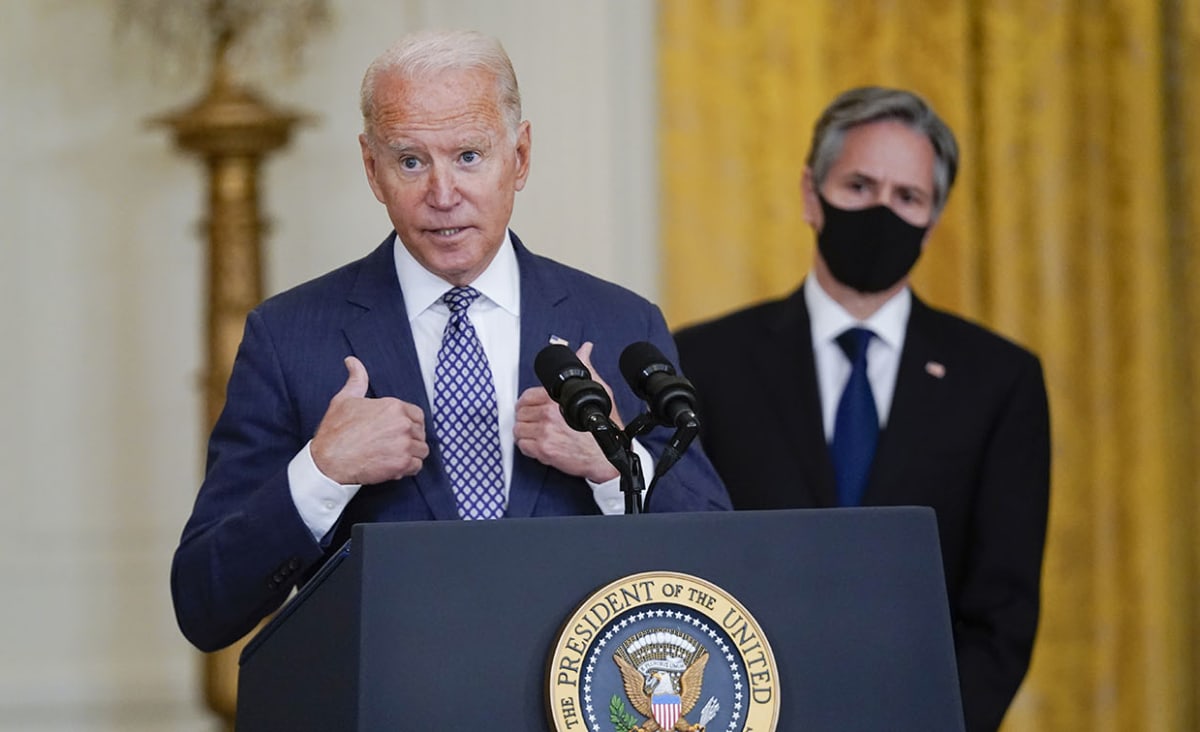
www.yahoo.com
5 takeaways from Biden's latest remarks on Afghanistan
President Biden on Friday sought to defend his administration's halting efforts to evacuate Americans and Afghan allies from Afghanistan after the Taliban's takeover.
Politics
President Biden on Friday sought to defend his administration’s halting efforts to evacuate Americans and Afghan allies from Afghanistan following the Taliban’s takeover of Kabul.
His remarks, delivered from the East Room of the White House, came amid blistering criticism from U.S. lawmakers and several world leaders over scenes of chaos that have emerged in and around Kabul’s airport in recent days.
Here are five key takeaways from Biden’s speech and his answers to questions from reporters.
1. Biden says U.S. has made ‘significant progress’ in the evacuation effort
The president said the United States has successfully deployed nearly 6,000 troops to Hamid Karzai International Airport in the last week to help manage the evacuations.
“We’ve made significant progress,” he said.
He said 13,000 people, including Americans and Afghans who have applied for Special Immigrant Visas, or SIVs, have been evacuated so far, including 5,700 on Thursday.
American flights out of Kabul resumed Friday after an eight-hour delay that U.S. officials blamed on a backup in processing people once they landed elsewhere, such as Qatar.
2. Biden acknowledges he can’t guarantee the final outcome
The president pledged to evacuate “any American who wants to come home” from Afghanistan, but said he could not guarantee that U.S. efforts would be wholly successful.
“This evacuation operation is dangerous. I cannot promise what the final outcome will be, or that it will be without risk of loss,” he said. “But as commander in chief, I can assure you I will mobilize every resource necessary.”
Asked whether U.S. forces — which have been limited to fortifying the airfield — would venture out to rescue Americans beyond the airport, Biden said they already had, noting that about 160 Americans were taken over the wall by troops earlier this week.
He added, however, that U.S. officials have had “no indication” that Americans have been denied access to the airport by the Taliban.
3. Biden says U.S. is now working closely with foreign allies
Biden said that over the last few days he had spoken with British Prime Minister Boris Johnson, German Chancellor Angela Merkel and French President Emmanuel Macron.
“We all agreed that we should convene, and we will convene the G-7 meeting next week, a group of the world’s leading democracies, so that together we can coordinate our mutual approach, our united approach on Afghanistan and moving forward,” he said.
Merkel and Biden spoke Wednesday, two days after the German leader had called the situation in Afghanistan “an extremely bitter development. Bitter, dramatic and terrifying.” The Telegraph reported that it took Biden 36 hours to return a call from Johnson, who was sharply rebuked by British legislators for the withdrawal this week. Macron was accused of pandering to the far right in his country by saying France should have a plan to “anticipate and protect itself from a wave of migrants,” but he told Biden on Friday there was a “moral responsibility” to evacuate Afghan allies.
When Biden was asked about the international response, he said he had seen “no question of our credibility from allies around the world.”
4. Biden downplays terror threat from Afghanistan, says danger lies elsewhere
The president said that with the diminishment of al-Qaida in the country and the killing of Osama bin Laden, the U.S. has no reason to be in Afghanistan at this point.
“Just imagine if bin Laden had decided with al-Qaida to launch an attack from Yemen,” Biden said. “Would we have ever gone to Afghanistan? Would there ever be any reason we would be in Afghanistan? Controlled by the Taliban? What is the national interest of the United States in that circumstance?
“The threat from terrorism has metastasized,” he continued. “There’s a greater danger from ISIS and al-Qaida and all these affiliates in other countries — by far — than there is in Afghanistan. We’re going to retain an over-the-horizon capacity that if they were able to come back — to be able to take them out, surgically. ... So this is where we should be, this is about America leading the world, and all our allies have agreed with that.”
When asked why Americans should trust the intelligence that there was no terrorist threat when it had misjudged what would happen with the Afghan army, Biden called the comparison “apples and oranges” and said the administration would know if terrorists began to accumulate in Afghanistan to plot against the United States.
5. Biden says the U.S. is in ‘constant contact’ with Taliban
Reiterating what his administration officials have been saying all week, Biden said that U.S. officials have been in frequent contact with Taliban leaders, who have said that no foreigners, including Americans, would be harmed on Afghan soil.
“We’ve been in constant contact with the Taliban leadership on the ground in Kabul, as well as the Taliban leadership in Doha,” he said. “And we’ve been coordinating.” He said that is how the United States was able to get all its diplomats out of the U.S. Embassy safely.
But despite the recent coordination, the president has said he doesn’t believe the Taliban have changed.
“I think they’re going through sort of an existential crisis,” he said in an interview with ABC’s George Stephanopoulos earlier this week. “Do they want to be recognized by the international community as being a legitimate government? I’m not sure they do.”
























































